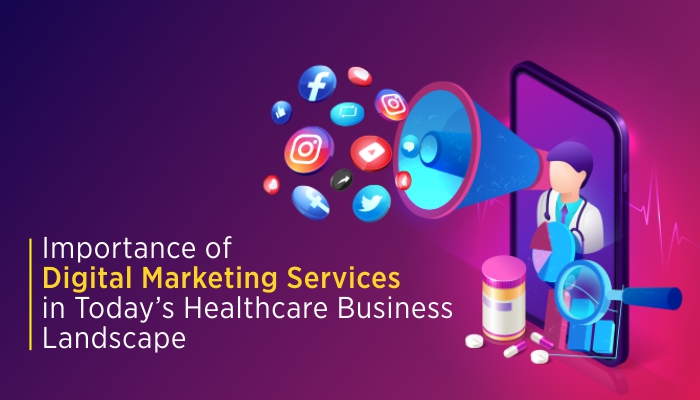
Importance of Digital Marketing Services in Today’s Healthcare Business Landscape
In today’s healthcare industries, the hashtag #getdigitized has taken center stage. In the middle of the COVID-19 pandemic, Digital Marketing services have arisen as a cutting-edge technique. Marketers prioritize digital marketing platforms above traditional print media.
The technology-driven approach to marketing healthcare industries has a significant benefit in terms of reach. The use of digital marketing by healthcare practitioners has various advantages. However, our focus will be on seven critical reasons that illustrate the relevance of digital marketing in this industry. The article underscores that successful healthcare providers must be adaptable, equipped to identify market opportunities, and adept at formulating effective strategies to navigate an ever-evolving environment.
How does Digital Marketing Promote Healthcare Businesses?
Digital marketing promotes healthcare businesses by leveraging online platforms and technologies to effectively reach and engage with a wide audience. Through various digital channels such as websites, social media, email campaigns, and search engines, healthcare providers can connect with patients, disseminate important information, and enhance their brand visibility. This dynamic approach allows healthcare businesses to not only showcase their services but also establish trust, provide valuable educational content, and offer personalized experiences to potential patients. In this way, digital marketing plays a pivotal role in elevating the presence and effectiveness of healthcare organizations in the competitive landscape of the modern healthcare industry.
1. Amplifying Brand Recognition and Exposure
Through online platforms like search engines, social media, and email marketing, healthcare enterprises can extend their reach to a wide audience, establishing a prominent presence. This is particularly crucial for fledgling ventures or those seeking to enter new markets.
2. Educating Potential Patients.
Digital Marketing enables healthcare organizations to disseminate vital information. It empowers patients to gain insights into their inquiries and concerns regarding different diseases or procedures. This aids them in making timely and well-informed decisions.
3. Cultivating Leads and Booking Appointments.
Digital marketing serves as a powerful tool for healthcare enterprises to generate leads and schedule appointments. For instance, utilizing pay-per-click (PPC) advertising allows businesses to target individuals actively seeking particular healthcare services or information. Additionally, leveraging social media and email marketing enables them to showcase their services and prompt individuals to schedule appointments.
4. Establishing Strong Patient Relationships.
Digital marketing is a valuable tool for fostering meaningful connections with patients. Healthcare businesses can utilize platforms like social media to engage with patients, address their inquiries, and offer assistance. Moreover, email marketing can be employed to deliver educational resources and timely appointment reminders.
Reaching Modern Consumers
Healthcare marketing is distinct due to the unique nature of healthcare services, which lack a direct monetary equivalent. The primary aim of healthcare marketing is to promote a healthy population, address chronic illnesses, and facilitate rehabilitation and reintegration. Digital Marketing needs to work on the importance of understanding patient’s latent needs.
Patient’s involvement in their own healthcare is deemed important, impacting lifestyle, habits, and medication choices. The piece highlights shifts in healthcare marketing trends over the past decade, including a move from mass marketing to personalized approaches, and from focusing on individual health episodes to building long-term relationships.
The patient is viewed as a vital contributor to the healthcare service delivery process, and their satisfaction is considered a paramount goal for healthcare organizations. Successful healthcare providers must be adaptable, able to detect market opportunities, and formulate effective strategies to navigate an ever-changing environment.
Digital marketing is presented as a critical tool for healthcare organizations to engage with modern consumers. It highlights the importance of tracking and measuring marketing efforts to inform decision-making and improve strategies. The increasing prominence of mobile and digital platforms in healthcare marketing, with over 80% of patients using smartphones to interact with healthcare providers.
Ultimately, the implementation of marketing strategies in healthcare organizations is advocated for various benefits. These include gaining a competitive edge, enhancing visibility and reputation, understanding patient needs, and ensuring positive patient experiences. Building a strong and effective brand is seen as crucial for success in the healthcare services market.
Strategies and Resources Employed in Healthcare Marketing
Healthcare marketing is a dynamic area that relies on a number of methods and resources to effectively reach and engage target consumers. The tactics and tools used may differ depending on aspects such as the size and type of healthcare business, as well as the population being targeted. However, there are certain common techniques and tools that play an important role in promoting healthcare services and developing a strong brand presence.
Online Presence & Brand Building
Establishing a comprehensive online presence is a pivotal tactic in healthcare marketing. This entails developing and maintaining a user-friendly website that offers valuable insights into the services offered, the expertise of healthcare professionals, and essential contact details. Additionally, employing search engine optimization (SEO) techniques ensures that the website attains a prominent position in search engine rankings, enhancing its discoverability among prospective patients.
Social Media
Social media platforms have become indispensable instruments in healthcare marketing. Creating a presence on platforms like Facebook, Twitter, and Instagram empowers healthcare enterprises to interact with a broader audience and provide pertinent and engaging content. Moreover, social media serves as a means to engage with patients, address their concerns, and showcase the personal side of healthcare professionals.
Content Development & Marketing
This involves creating and sharing relevant, informative, and engaging content, such as blog posts, articles, videos, and infographics. Providing valuable information not only positions the healthcare business as an authority in its field but also builds trust with potential patients.
Email Marketing
Sending regular newsletters and updates to a targeted list of subscribers allows healthcare providers to stay in touch with their audience, share important news or promotions, and nurture relationships over time.
Patient Testimonials
Patient testimonials and reviews are immensely influential in healthcare marketing. Positive feedback from satisfied patients serves as a powerful endorsement and can significantly impact the decision-making process of potential patients. Encouraging and showcasing these testimonials can help build credibility and trust.
In addition to these strategies, leveraging digital advertising, participating in community events, and forming partnerships with other healthcare providers or organizations can also be effective resources in healthcare marketing.
Overall, a well-rounded healthcare marketing strategy combines various approaches and utilizes a range of resources to effectively connect with target audiences, establish trust, and ultimately drive patient engagement and loyalty.
Healthcare businesses have access to various tools like paid advertising, direct mail, and print advertising. However, the most effective strategies and resources depend on the specific goals and target audience of the business.
It’s important to recognize that healthcare marketing is intricate and subject to strict regulations. Make sure that the information you use to promote your business is correct and honest. Follow the rules and laws that apply, including those about patient information.
By combining these strategies and using the right resources, healthcare businesses can successfully promote their services and establish strong connections with their patients.
To sum up, digital marketing is a potent tool that can help healthcare professionals achieve greater success. By embracing its potential and applying effective strategies, practitioners can improve patient retention, streamline communication, lower acquisition costs, and ultimately surpass competitors in the constantly evolving healthcare industry.
